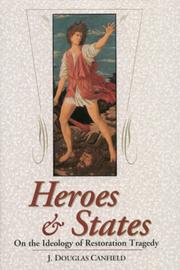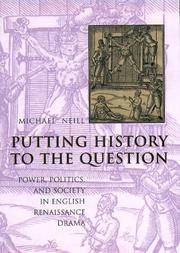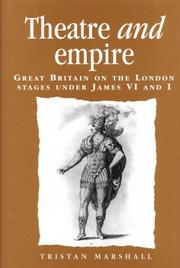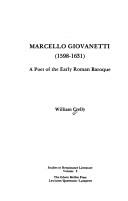| Listing 1 - 4 of 4 |
Sort by
|

ISBN: 081315958X 9780813159584 0813121256 9780813121253 0813193915 9780813193915 Year: 2000 Publisher: Lexington, Kentucky : The University Press of Kentucky,
Abstract | Keywords | Export | Availability | Bookmark
 Loading...
Loading...Choose an application
- Reference Manager
- EndNote
- RefWorks (Direct export to RefWorks)
To understand the cultural history of England during the Restoration, one need look no further than the theater, which was attended by the gentry as well as by members of the middle and lower classes. The theater of this period embodied the values, meanings, and power relations of Restoration England. In Heroes and States, Douglas Canfield argues that drama not only represents but actually helps constitute the value and belief systems of an entire culture. Heroes and States completes Canfield's two-volume cultural history of Restoration drama, begun in Tricksters and Estates: On the Ideology
Heroes in literature. --- State, The, in literature. --- Nationalism in literature. --- Political plays, English --- Politics and literature --- English drama (Tragedy) --- English drama --- History and criticism. --- History

ISBN: 0231113323 Year: 2000 Publisher: New York, N.Y. Columbia University Press
Abstract | Keywords | Export | Availability | Bookmark
 Loading...
Loading...Choose an application
- Reference Manager
- EndNote
- RefWorks (Direct export to RefWorks)
English literature --- Thematology --- Drama --- anno 1600-1699 --- English drama --- Literature and history --- Literature and society --- Political plays, English --- Politics and literature --- Power (Social sciences) in literature. --- Renaissance --- History and criticism. --- History. --- History

ISBN: 152613473X 9781526134738 0719057485 9780719057489 1526134748 Year: 2000 Publisher: New York : Baltimore, Md. : Distributed exclusively in the USA by St. Martin's Press, Project MUSE,
Abstract | Keywords | Export | Availability | Bookmark
 Loading...
Loading...Choose an application
- Reference Manager
- EndNote
- RefWorks (Direct export to RefWorks)
Theatre and empire looks at the genesis of British national identity in the reign of King James VI and I. While devolution is currently decentralising Britain, this book examines how the idea of a united kingdom was created in the first place. It does this by studying two things: the political language of the King's project to replace England, Scotland and Wales with a single kingdom of Great Britain; and cultural representations of empire on the public and private stages. The book argues that between 1603 and 1625 a group of playwrights celebrated a new national consciousness in works as diverse as Middleton's Hengist, King of Kent, Rowley's The Birth of Merlin and Shakespeare's Cymbeline. Specifically Jacobean interdisciplinary studies are few compared with Elizabethan and Caroline works, but the book attempts to redress the balance by offering a fresh appraisal of James Stuart's reign. Looking at both established and little-known plays and playwrights, Theatre and empire rewrites our understanding of the political and cultural context of the Jacobean stage.
Colonies in literature. --- Imperialism in literature. --- Nationalism in literature. --- Political plays, English --- Theater --- Politics and literature --- English drama --- History and criticism. --- History --- Great Britain --- In literature. --- Historiography. --- Empire. --- England. --- English throne. --- Great Britain. --- Jacobean empire. --- Jacobean. --- King James VI. --- King James. --- London stages. --- Middleton. --- Rowley. --- Scotland. --- Shakespeare. --- Theatre. --- drama. --- dramatic material. --- early modern history. --- foreign policy. --- plays. --- political culture. --- public opinion. --- stage. --- theatre companies.

ISBN: 077347692X 0889461430 Year: 2000 Publisher: Lewiston (N.Y.) : Edwin Mellen Press,
Abstract | Keywords | Export | Availability | Bookmark
 Loading...
Loading...Choose an application
- Reference Manager
- EndNote
- RefWorks (Direct export to RefWorks)
Allegory. --- Body, Human, in literature. --- Chastity in literature. --- Civilization, Medieval, in literature. --- Dialogue. --- Drama --- English language --- Epic poetry, English --- Human body in literature. --- Kings and rulers in literature. --- Literature and state --- Magicians in literature. --- Medievalism --- Metaphor. --- Middle Ages in literature. --- Political plays, English --- Politics and literature --- Renaissance --- Sex role in literature. --- Speech in literature. --- State, The, in literature. --- Theater --- Women and literature --- Women in literature. --- Women --- Technique. --- Spoken English. --- History and criticism. --- History. --- History --- Production and direction. --- Education --- Social conditions. --- Shakespeare, William, --- Characters --- Kings and rulers. --- Political and social views. --- Histories.
| Listing 1 - 4 of 4 |
Sort by
|

 Search
Search Feedback
Feedback About UniCat
About UniCat  Help
Help News
News